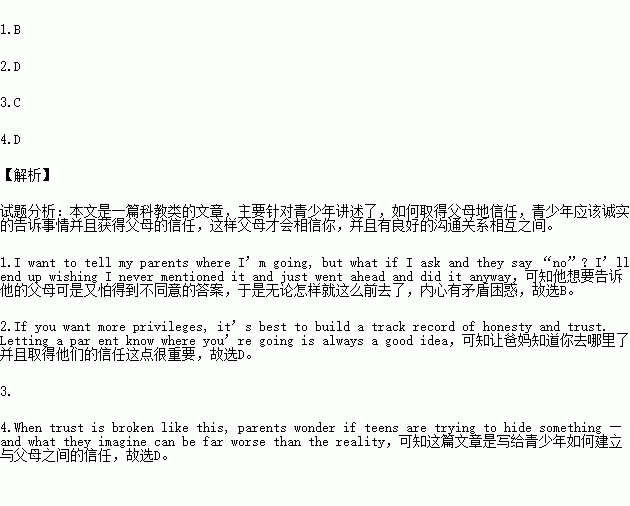题目内容
I got invited to go with some friends to a game at another school. A senior will be driving us, and I think she’s a good driver, but it’s someone my parents don’t know. I want to tell my parents where I’m going, but what if I ask and they say “no”? I’ll end up wishing I never mentioned it and just went ahead and did it anyway.
If you want more privileges, it’s best to build a track record of honesty and trust. Letting a par ent know where you’re going is always a good idea.
ent know where you’re going is always a good idea.
You may worry that telling your parents puts you at risk of getting “no” for an answer. But there’s a good chance your parents might be OK with you going. If you go but don’t tell them, you risk losing something more important — your parents’ trust.
Parents who find out their kids did something behind their backs may be less likely to give permission to do things in the future. When trust is broken like this, parents wonder if teens are trying to hide something — and what they imagine can be far worse than the reality.
Before you talk to your parents about the game, think about which approach will help them feel most comfortable with giving you more freedom. Maybe they’d like to meet the person driving or talk to friends who have driven with her in the past. If your parents have questions or hesitate about letting you go, find out what their worries are and then do your best to answer them.
1.From Paragraph 1 we know that the writer _________.
A. appears nervous B. feels confused
C. looks worried D. seems discouraged
2.What is the best way to get parents’ permission according to the passage?
A. To get more privileges from them.
B. To risk gaining their permission.
C. To keep off the track of reality.
D. To be honest a nd win their trust.
nd win their trust.
3.What does the writer really want to tell us?
A. Which effective approach to use.
B. How to deal with strict parents.
C. How to win over parents.
D. How to get freedom from parents.
4.Who do you think the passage is intended for?
A. Parents. B. Friends. C. Drivers. D. Teenagers.


 de Doris feel by her mistake.But her willingness to ignore the mistake,Doris was sharing her kindness with the next generation.
de Doris feel by her mistake.But her willingness to ignore the mistake,Doris was sharing her kindness with the next generation.